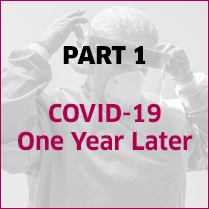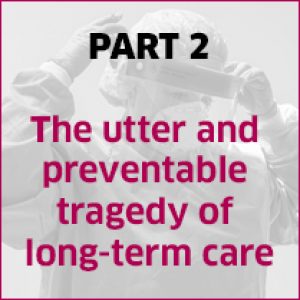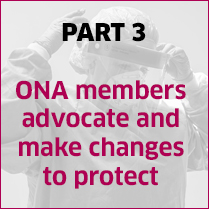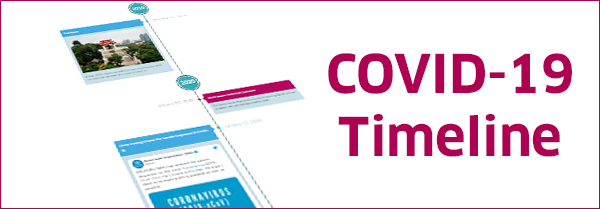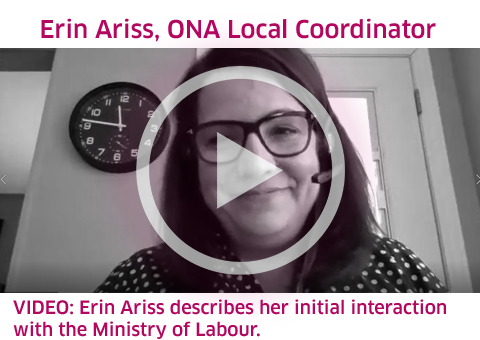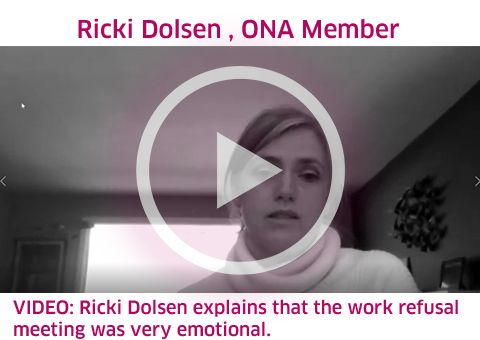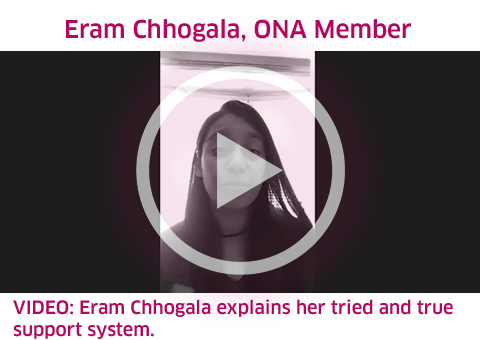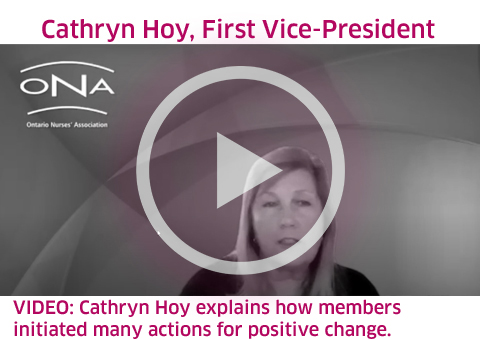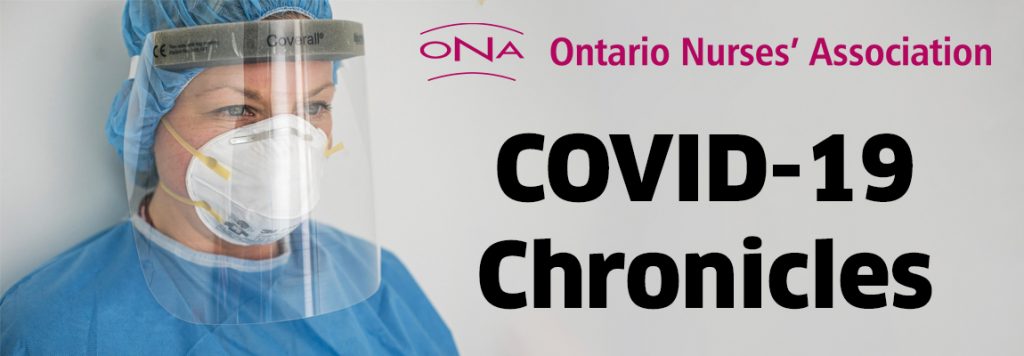
Strong member advocacy brings positive changes to workplaces
Imagine that the world is on the verge of a global pandemic. News from around the globe is concerning. A deadly airborne virus is making its way on a destructive path from country to country and it’s only a matter of limited time before it reaches your community.
You are a front-line registered nurse and your employer has said that they have a stockpile of PPE, including plenty of the N95 respirators to protect workers.
A sigh of relief. But it is short-lived.
ONA Local Coordinator Erin Ariss faced this situation. A long-time registered nurse in the Kitchener-Waterloo region, she cautioned the employer in January to prepare for the approaching pandemic. When she and her colleagues went to find the stockpile at her workplace, what they discovered was shocking.
“The pandemic supply locker was located in the ambulance bay, which was filled with Rubbermaid containers,” Ariss explains. “And I was shocked by their contents. There were expired PAPRs, unusable gowns and gloves, and the bins had rodent infestations in them. I was devastated.”
Ariss – a seasoned ONA leader whose voice is as strong as her courage – informed her Labour Relations Officer and the real work began to protect workers. One of her first phone calls was to the Ministry of Labour so that an inspector could come and issue orders to the employer to prepare for the pandemic, including having N95 respirators available to staff. Regrettably, the inspector did not issue orders because, “there weren’t any COVID-19 cases in her region.” Ariss notes – “Yet.”
Fast forward to a regular Joint Health and Safety Committee meeting on March 19, 2020. The employer informed the committee that there was a potential COVID-19 exposure in the ICU. “This exposure involved 55 of our members, which was over a timespan of 36 hours, to staff in the ICU and in the emergency department. You can’t make this up. We should have been informed immediately of the exposure,” said Ariss.
Given that, at the time, little was known about the effects of the virus, it was more than upsetting to learn of the exposure. “It almost seemed like a death sentence, and it seemed like we were going to lose our members. It was a very emotional experience.”
Ariss’ employer continued to try to downplay the exposure, but Ariss knew that she could not let it go.
“I immediately called my Labour Relations Officer, ONA’s health and safety specialist, and I reached out to ONA provincial leaders,” notes Ariss. “I got immediate results and support. I sent out a plea for help and within 10 minutes, ONA told me that help was coming.”
Help arrived. Ariss’ employer continued to avoid preparing and failed to inform staff of developments, while Ariss and her ONA team, including front-line members, geared up to demand the employer prepare for the pandemic.
“Nurses were exposed as they performed emergency medical procedures on the patient and the patient was not isolated. And worst of all, nurses were unable to access N95 respirators when they performed the procedures, as their employer strongly discouraged nurses wearing them.” ONA President Vicki McKenna says that more nurses were unknowingly exposed to COVID-19 by a co-worker; worse, several nurses subsequently became sick. “This was a clear example of what should never happen in infection prevention and control in health care,” says McKenna.
Ariss says her members’ demands were simple: to work openly, honestly and to collaborate with the employer to expedite COVID-19 testing for all nurses and health-care workers who were exposed, support them as they awaited their test results, ensure that screening protocols are followed and PPE was worn. The employer initially resisted. Ariss was forced to call ONA’s legal team to get advice and support.
“There were a team of lawyers getting affidavits from members because PPE was locked up and unavailable,” she says. “You had to talk to the manager or security guard to get a key. Our workers were getting sick and our members started to fall,” recalls Ariss. “The lawyers were prepping me, they were there to support me. I had Vicki and Region 4 Vice-President Angela Preocanin there for us and my LRO was unbelievable.”
The end result from that tireless work?
“There were huge changes. First thing that happened is that PPE was unlocked and it was not rationed. The PPE conservation committee recommended purchasing P100 respirators, which would be less expensive than to provide N95 masks. Our settlement looks a lot like Directive #5. I think that our settlement influenced what happened in the province. This would never have happened without ONA’s support and interventions,” says Ariss.
When the potential for a work refusal is imminent
During the early days of the pandemic, employers locking up PPE appeared to be an appalling trend that spread through many sectors across Ontario. ONA had received many member and leader reports that the inaccessibility of PPE to workers was prominent and was an ongoing pattern of PPE control.
Add these challenges to a workforce on edge due to the uncertainty of the pandemic and the potential for work refusals was very real.
ONA member Ricki Dolsen – who has many years of health and safety experience, including as a worker rep co-chair on the Joint Health and Safety Committee – says that her job was to support her members as best as possible, including exploring avenues to take when the employer refused to work with her.
Last spring, a nurse working on a unit wanted an N95 respirator for protection. The employer refused the nurse’s request. There was much discussion among the nurse, Ricki and the employer to try to resolve the issue. Ultimately, Ricki and her colleagues supported the nurse and provided information about the steps needed to refuse unsafe work. “Refusing unsafe work is an unspoken right in nursing and many are fearful to do it,” notes Dolsen. “It’s not something that you do on a whim – it must be well thought out. There is a lot of reluctance to enact this right as a health-care worker, but we are here to support and provide the information.”
A group of brave nurses from the hospital’s chemotherapy unit requested the highest level of PPE. It was refused. The group of nine women – some of whom had serious underlying health conditions that made them more susceptible to becoming ill – refused unsafe work. “It was a pretty emotional and empowering day. The nurses felt that the employer did not put them at a high priority and needed to make sure they were heard,” notes Dolsen.
Heard, they were. “It took a lot of courage to refuse the unsafe work. They were terrified but, at the end of the day, I believe our case helped to push Directive #5 to make it a reality.”
“One breath at a time”
In 2003, SARS hit the Scarborough community, and it hit hard. When COVID-19 began, ONA members in Scarborough had a similar thought: not again.
“We were stunned when we found out that there is a virus coming and the first cases brought us worry,” says ONA member Eram Chhogala who works in a busy Scarborough hospital. “SARS and Ebola should have been the check-in points to ensure Ontario is prepared for future pandemics. A lot of my colleagues were shaken and stunned and had lots of questions.”
Questions about protocols, screening and, most importantly, PPE availability. “We had to get N95 mask-fitted early in the pandemic because the more common sizes were running out and we needed back-up sizing. I was hoping that we wouldn’t have to resort to wearing garbage bags for PPE.”
It is tragic and unacceptable that some of our members did resort to wearing garbage bags for protection. “It is completely inexcusable,” notes McKenna. “Everyone must have the PPE available to them. Full stop.”
ONA was one of the first organizations out of the pandemic gate to underscore that COVID-19 can be transmitted by aerosols, and members needed to be adequately protected.
“We had to push to make everyone understand we need N95s and proper gowns and proper gloves because the mode is more than contact droplet,” says Chhogala. She applauds ONA’s fight for worker protections that had to be handled through the courts, but was angry that ONA had to go to court to give workers protection. “Providing PPE should have been automatic.”
And how does Chhogala continue to get through this pandemic? Well, not just by taking one day at a time. “I keep on telling myself to get through one breath at a time, just keep breathing.” Well said.
“We should not be shy about using our voice for change”
If there is one silver lining that has come out of the pandemic, it’s that a new and strong wave of ONA member advocacy and engagement has taken root and begun to grow across Ontario workplaces.
Notes ONA First Vice-President Cathryn Hoy: “We are being transformed into a more sophisticated and stronger voice with greater influence in health care.”
Member actions over the past 17 months have been plentiful. “Members are mobilizing and speaking up, we are meeting with our MPPs, communicating with our colleagues on issues that affect us all in our workplaces, and they are doing such a wonderful job,” says Hoy.
The pandemic has put a sharp focus on nurses and their role as advocates. The poorly rolled-out provincial plan related to PPE availability and distribution was, as some may say, chaotic and a disaster. Yet, our front-line members – armed with facts and information from ONA – spoke out to their employers about the need for proper PPE so they can do their jobs safely. Nursing continues to have immense potential to create and disseminate messages about patient care issues that will benefit all. The working conditions for health care workers are the conditions for patient/resident care.
“Activism and advocacy are being reignited and our members are leading the way,” notes Hoy. “Activism can take many forms, including protests, petitions, calls to our MPPs and political engagement. We should not be shy about using our voice for change.”
Although the past 16 months have been challenging to say the least for nurses and health-care professionals – challenges that include the Ford government implementing legislation that negatively impacts nurses such as Bill 124 and Bill 195 – their advocacy has raised the awareness of the need for change.
“I am so proud of our members who voiced their concerns and saw tangible and positive changes in their workplaces,” Hoy explains. “We are just building on our advocacy, and more is to come. I can’t wait to see what we all do next.”

